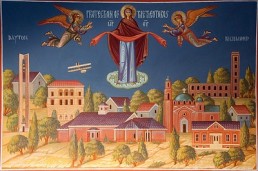[ad_1]

If in this life only we have hope in Christ, we are of all men the most pitiable. (1 Corinthians 15:19)
The Christian message is not mostly about how to live in this world – rather it is a message to help us use this life and this world as a preparation for life in the world to come. Christ did not offer a new philosophy to help people be more successful in this world. Christianity, instead, tells us to use our life in this world as a preparation for the Kingdom which is to come. In fact, Christ did not completely prepare us His disciples for life in this world rather warning us that in the here and now we would have tribulation and sorrow. He is overcoming this world and its many sorrows and temptations.

We live our life within the context of the fallen world, but are given hope in realizing this world is but a tiny portion of the entire created cosmos and history. This world is not all there is to existence, but connects us to the greater reality of heaven and the eschaton. The Liturgy itself is to help us situate our life in this world within the context of the Kingdom of God. Filled by the Holy Spirit at the Liturgy, united to Christ in Holy Communion, the Liturgy (or any liturgical service for that matter) is not meant to draw us out of the world, but to prepare us to enter the world as God’s servants.

“There is a ‘before’ of worship and an ‘after.’ The ‘before’ is the preparation, the march to the altar which implies an asceticism of preparation, of repentance, of work, of self-forgetfulness, of fasting, of expectation, of a growing love of Christ, which is inscribed in the week. The ‘after’ is the return to the world when, after partaking of the Eucharist, we are filled with the true light which we have ‘seen’; we have become vessels of the Holy Spirit, of his joy and his peace which we have to preserve and shine forth in our home, our work, our life in the world.” (Boris Bobrinskoy)

He reminds us that the dismissal of the faithful at the end of the Liturgy does not signify their ‘departure from the church, but their entry into the world by the preaching of the gospel, for a living testimony to Christ.’ (Maxime Egger, THE COMPASSION OF THE FATHER, p 29)

To state the same idea in another way, I’ve seen a couple of churches have at the entrance to their parking lots a sign that says something to the effect: “Enter to Worship. Exit to Serve.” As we say in the Nicene Creed: “I look for the resurrection of the dead, and life in the world to come.” We follow Christ now on earth but live also for life in the world to come. “I have said this to you, that in me you may have peace. In the world you have tribulation; but be of good cheer, I have overcome the world” (John 16:33).

